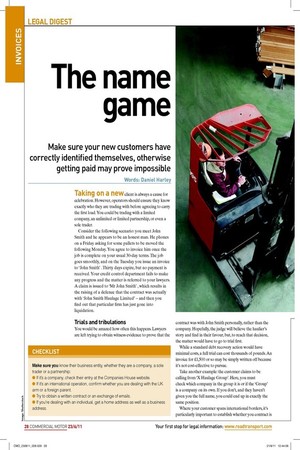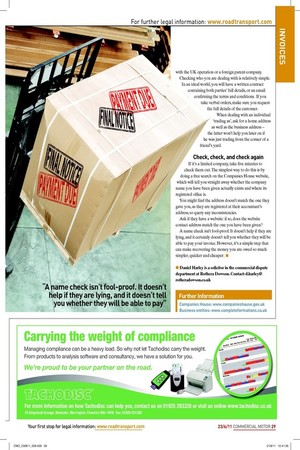The name game
Page 23

Page 24

If you've noticed an error in this article please click here to report it so we can fix it.
Make sure your new customers have correctly identified themselves, otherwise getting paid may prove impossible
Words: Daniel Harley
Taking on a new client is always a cause for celebration. However, operators should ensure they know exactly who they are trading with before agreeing to carry the irst load. You could be trading with a limited company, an unlimited or limited partnership, or even a sole trader.
Consider the following scenario: you meet John Smith and he appears to be an honest man. He phones on a Friday asking for some pallets to be moved the following Monday. You agree to invoice him once the job is complete on your usual 30-day terms. The job goes smoothly, and on the Tuesday you issue an invoice to ‘John Smith’ . Thirty days expire, but no payment is received. Your credit control department fails to make any progress and the matter is referred to your lawyers. A claim is issued to ‘Mr John Smith’ , which results in the raising of a defence that the contract was actually with ‘John Smith Haulage Limited’ – and then you ind out that particular irm has just gone into liquidation.
Trials and tribulations
You would be amazed how often this happens. Lawyers are left trying to obtain witness evidence to prove that the contract was with John Smith personally, rather than the company. Hopefully, the judge will believe the haulier’s story and ind in their favour, but, to reach that decision, the matter would have to go to trial irst.
While a standard debt recovery action would have minimal costs, a full trial can cost thousands of pounds. An invoice for £1,500 or so may be simply written off because it’s not cost-effective to pursue.
Take another example: the customer claims to be calling from ‘X Haulage Group’ . Here, you must check which company in the group it is or if the ‘Group’ is a company on its own. If you don’t, and they haven’t given you the full name, you could end up in exactly the same position.
Where your customer spans international borders, it’s particularly important to establish whether you contract is with the UK operation or a foreign parent company. Checking who you are dealing with is relatively simple. In an ideal world, you will have a written contract containing both parties’ full details, or an email conirming the terms and conditions. If you take verbal orders, make sure you request the full details of the customer.
When dealing with an individual ‘trading as’ , ask for a home address as well as the business address – the latter won’t help you later on if he was just trading from the corner of a friend’s yard.
Check, check, and check again
If it’s a limited company, take ive minutes to check them out. The simplest way to do this is by doing a free search on the Companies House website, which will tell you straight away whether the company name you have been given actually exists and where its registered ofice is.
You might ind the address doesn’t match the one they gave you, as they are registered at their accountant’s address, so query any inconsistencies.
Ask if they have a website: if so, does the website contact address match the one you have been given?
A name check isn’t fool-proof. It doesn’t help if they are lying, and it certainly doesn’t tell you whether they will be able to pay your invoice. However, it’s a simple step that can make recovering the money you are owed so much simpler, quicker and cheaper. ■













































